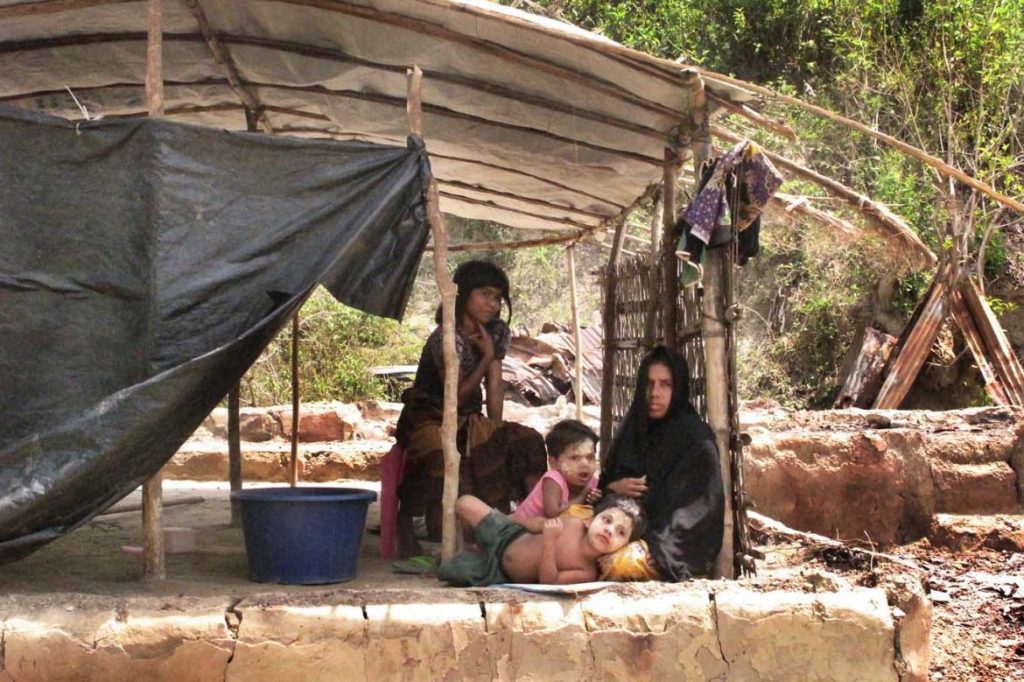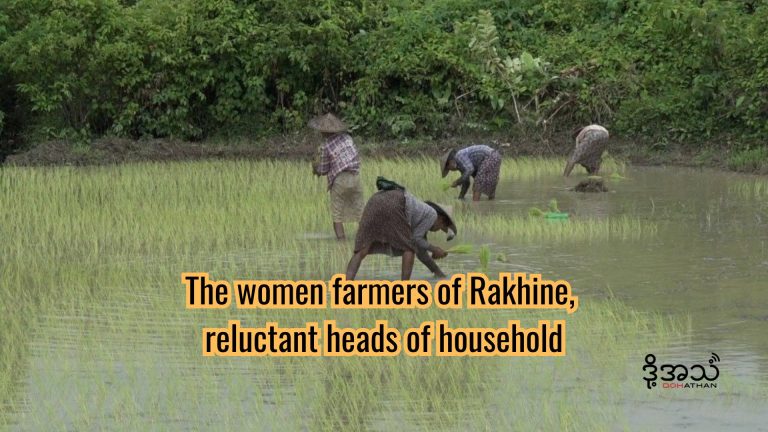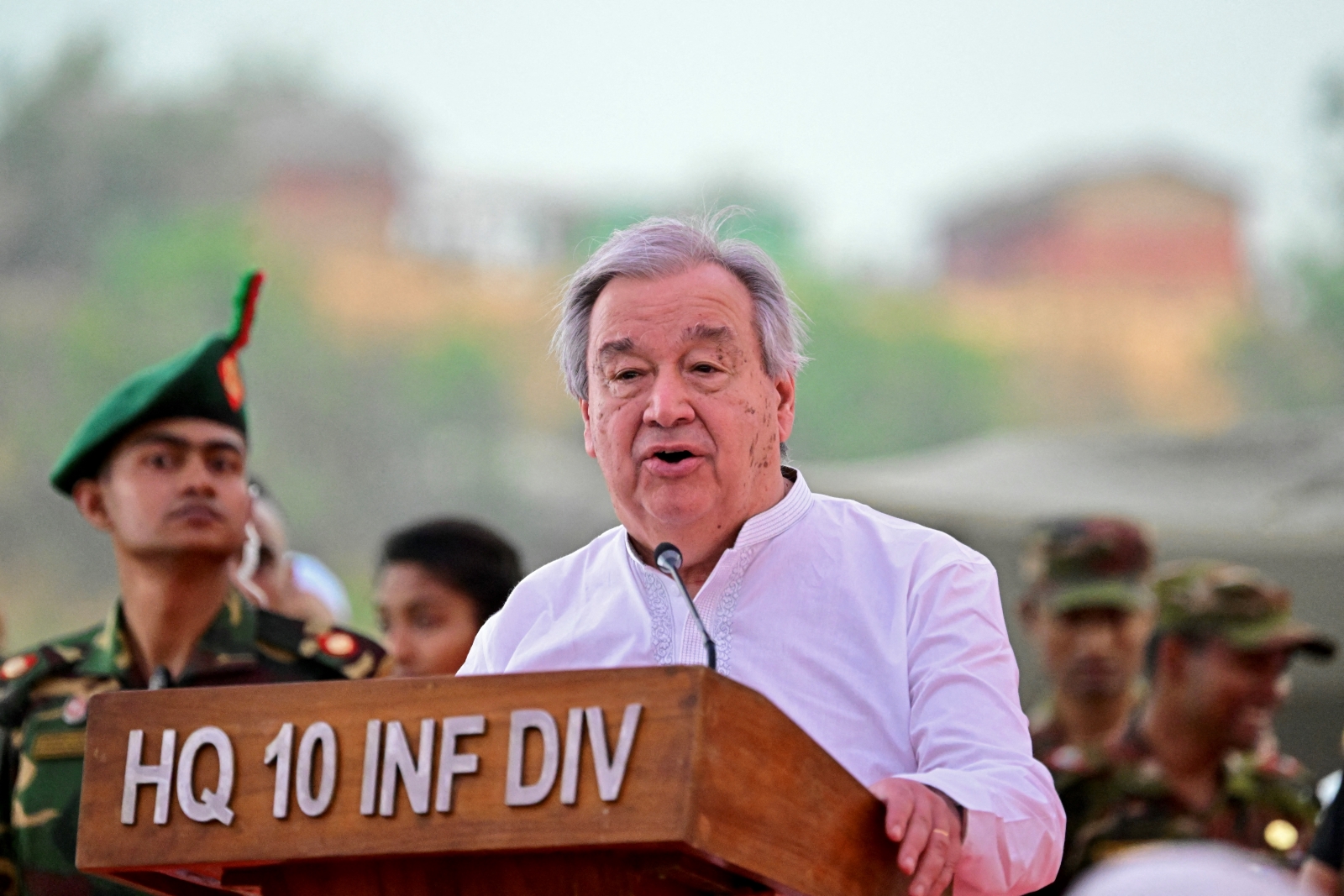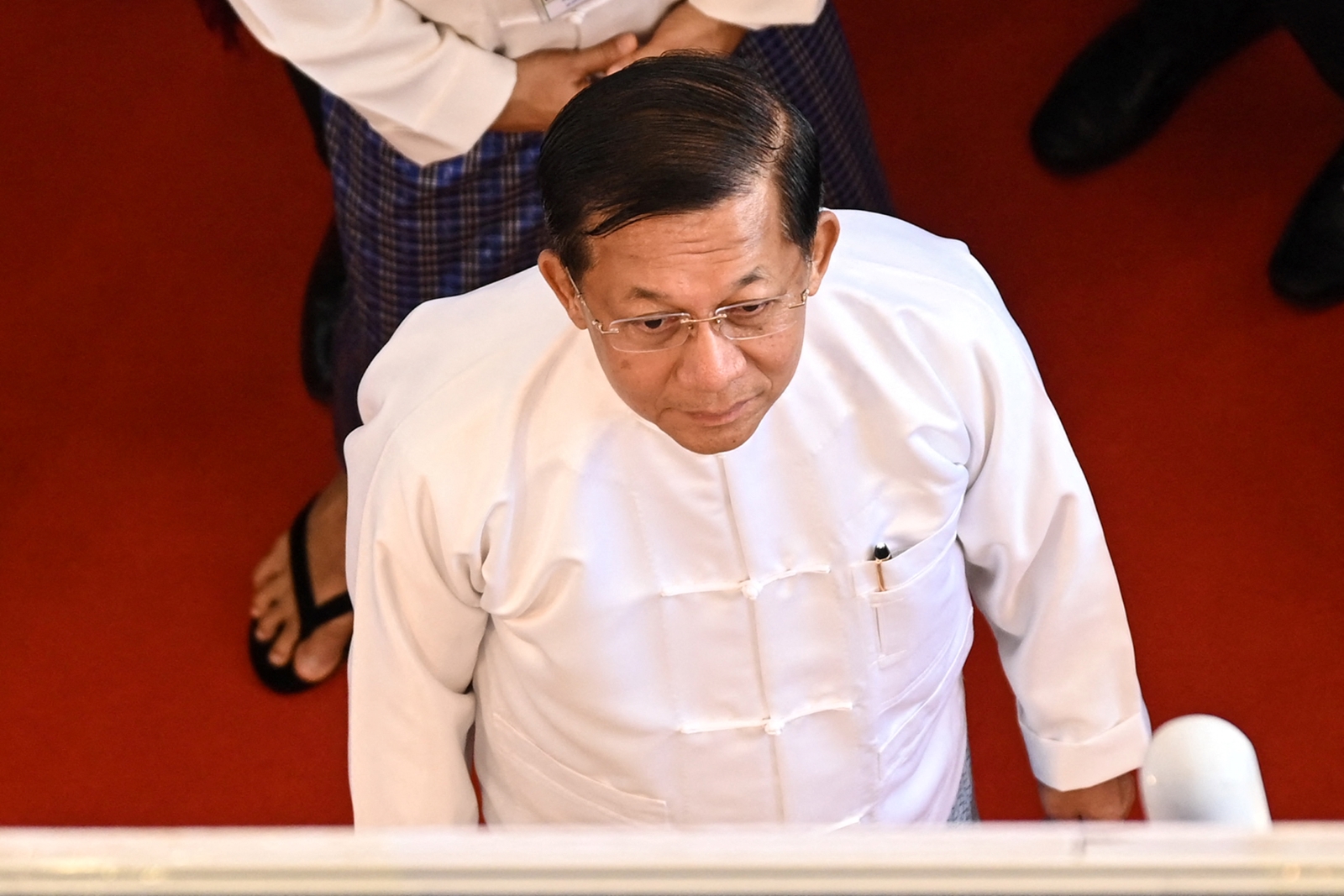A government-arranged trip to Maungdaw District enabled journalists to learn of the concerns and needs of some of its 800,000 residents, most of them Muslims.
By NYAN HLAING LYNN | FRONTIER
GREEN FIELDS, grey mountain ranges, streams, mangroves, villages sheltered by trees of all sizes, and occasional glimpses of the Naf River made the travellers on the bus forget about the bumpy road. They are common scenes in Rakhine State’s Maungdaw District, which shares a 236-kilometre (147-mile) border with Bangladesh.
But the region’s natural beauty masks the fear and deprivation that stalk many of the 905 villages in the district, which is home to 700,000 Muslims and 100,000 Rakhine Buddhists.
Violence scarred this area six months earlier when Muslim militants launched deadly attacks on border police posts and the Tatmadaw responded with a massive clearance operation that generated allegations of murder, rape and the torching of villages.
Frontier was among 18 journalists, Myanmar and foreign, who travelled to Maungdaw Township and neighbouring Buthidaung Township on a government-arranged trip from March 29 to 31. We visited 16 villages and four camps for those displaced by communal violence. Their residents told us of their fears, needs and dreams.
Support more independent journalism like this. Sign up to be a Frontier member.
Frontier has decided not to identify them by name because of recent reprisal attacks against those who have spoken to the media.
Among them was a 40-year-old Rakhine housewife in Aung Mingala village who said the violence and its tense aftermath had badly affected livelihoods.
“Now it is worse than before, when you could go out and work to support yourself and your family. Now I’m afraid when I hear bad news, especially about the violence,” she said.
21.jpg

In all 14 Muslim villages that journalists visited, including Pyaung Pike, residents accused the military of abuses including arson and rape. (Nyan Hlaing Lynn | Frontier)
Of the 16 villages visited by the media team, Aung Mingala was one of two inhabited by ethnic Rakhine. The other, Pha Wut Chaung, is bigger than Aung Mingala and its residents seemed to be less anxious. Pha Wut Chaung is a model village – known as a Na Ta La village – and was established 23 years ago.
A group of Muslim men building a road in Pha Wut Chaung said they were well and felt safe, as did a Muslim boy of about 14 with a bicycle who was selling sweets. He could speak a little Myanmar because he had attended school until second grade.
With the help of the boy and an interpreter, we learned that the men were from nearby Muslim villages. They were working as road-builders because they had not been able to fish or chop wood or bamboo in the nearby forests since the October 9 attacks.
A 55-year-old Rakhine resident of Pha Wut Chaung said there was no problem living together with Muslims. However, a 63-year-old former village administrator who has lived in Pha Wut Chaung since it was founded said he was still in fear of being attacked in the village and while travelling on the area’s roads.
The citizenship challenge
The 14 Muslim villages we visited were all very poor and the atmosphere was not as calm as in the Rakhine villages.
The Muslim villagers said they resented not being recognised as citizens of Myanmar, and similar feelings were expressed by residents of Thepkepyin, Dapaing and Bawdupha 1 and 2, the four IDP camps nearest to the state capital, Sittwe.
All of the Muslims we interviewed were deeply distrustful of the government plan which requires them to surrender any identify documents they may have so they can be issued with National Verification Cards. The NVCs do not guarantee citizenship, but qualify holders to apply for citizenship through a formal process at a later date.
Their main reason for not wanting to be issued with NVCs was the fear they would be labelled “Bengalis”, the term used by the government and most Myanmar for those who identify as Rohingya. This is despite the blue-coloured NVCs being different to previous identity cards because they do not list the holder’s ethnic or religious affiliation.
Residents of the Muslim villages insisted on being recognised only as Rohingya, but those in the four IDP camps said they would accept being described as “Rakhine-Muslim”.
19.jpg

The remains of a market in Kyet Yoe Pyin village that was destroyed by re during the military clearance operation.
However, people on the street in Sittwe reject the “Rakhine-Muslim” label.
U Maung San, 59, a security guard at a hotel in the state capital, said there was no Rakhine group that was Muslim, although he was apparently unaware of the Kaman, the Rakhine Muslims recognised as one of the country’s 135 ethnic groups.
Government officials take a similar line. Border Guard Police Force commander Police Brigadier Thura San Lwin said that since the time of the former government the country had been clear there was no group in Myanmar known as the Rohingya.
However, this would not preclude stateless Muslims in Rakhine State from attaining citizenship, he added.
If a person’s grandparents and parents hold a National Registration Card – the forerunner of the pink-coloured Citizenship Scrutiny Card now in use – then “he or she will be given a citizenship card immediately after getting an NVC”, San Lwin told the media group on March 31.
Even if they no longer have the cards, they can still attain citizenship through the scrutinisation process, he said.
“Even if their grandparents don’t have an NRC, if one of the person’s siblings does have one they will be given citizenship. If there is any evidence that their grandparents have lived here, they will also be given citizenship,” San Lwin said.
Despite these promises, uptake has been very slow. U Than Shwe, Immigration Department officer for Maungdaw District, said that of its 700,000 Muslims, only 5,000 had accepted NVC cards.
The border guard police chief said Muslims who accept NVCs were in fear of being killed by those within their community who oppose the verification scheme.
“Anyone who accepts an NVC is threatened and some flee their villages in fear for their lives,” San Lwin said, adding that the situation was controlled by Muslim community leaders.
“If the leader of a village permits them to accept NVCs, they will all accept them. Some are getting them secretly now,” he said.
“The situation on the ground is such that if you want to receive an NVC, you have to do it secretly.”
Because residents don’t hold NVCs, they face difficulties in travelling, working and operating businesses – including fishing, one of the main income-earners in the area.
The authorities have denied this is a problem, saying that residents could apply to local officials for permission to travel. But it was clear when Frontier visited Aleh Than Kyaw village that the lack of identity cards was having a major impact.
There, more than 100 boats were docked on the riverbank and more than 1,000 workers were unemployed. “They haven’t applied for an NVC. I can’t run my boats because I have no workers. I lost about K200 million over the past six months,” said U Than Htay, an ethnic Rakhine businessman who owns more than 10 boats.
Sithu Aung Myint, a journalist who has written extensively on Rakhine State and joined the media trip, said resolving the citizenship issue was fundamental for alleviating the crisis in Rakhine State.
“They don’t come and apply for NVCs because [of the rules that have] been imposed. On the other hand, authorities can only let them do business if they have NVCs. So this is a big crisis,” he said.
25.jpg

Border Guard Police Force commander Police Brigadier-General Thura San Lwin. (Nyan Hlaing Lynn | Frontier)
Although the NVCs do not mention ethnicity or religion, Muslim communities are worried that if they are approved for citizenship, their new identity card will identify them as Bengali. Some also object to having to undergo citizenship verification given that, they say, they were previously recognised as full citizens.
The government says it is meeting residents in order to build support for its initiatives but this was not evident when Frontier visited. Most Muslim residents have no access to newspapers in any language, and few listen to the recently launched radio station, Mayu FM, which broadcasts in their language.
Instead, they get their information through Facebook and Viber using SIM cards from Bangladesh, although they are reluctant to discuss this because it is illegal to use foreign SIM cards.
A climate of fear
According to information released by the government, violence within the Muslim community claimed 23 lives between October 9 and April 3, with another 10 people missing. Most of the victims were stabbed by men wearing masks, though two were shot, the government said.
According to a recent Reuters report, the killings of Muslims working with the government began after the security forces embarked on mass arrests of suspected militants in November. Between October 9 and December 12, the security operation resulted in the arrest of 524 people on a range of charges, according to official figures.
Despite the massive security operation after the October attacks, Police Sergeant Tun Naing from the Border Guard Police post at South Bazaar said militant training camps were expanding from the Maungdaw area into Buthidaung Township. One of these alleged training camps was discovered in a gully near Tin May village, in Buthidaung’s Nga Yan Chaung village tract, on March 1, he said. Seventeen people were arrested at the camp.
Journalists were able to meet two relatives of those arrested. They insisted that their relatives were innocent and that the training was “just a rumour”.
During the visit to Tin May on March 29, the village in-charge, Hamid Ullah, told journalists he feared for his safety because he had provided Maungdaw District administrators with information about militant training camps in the area. He complained of not being provided any security, despite receiving threats.
Two days later, he was dead. A group of masked men broke into his home around 1:15am on April 1 and slit his throat while he was sleeping, according to a government statement.
He was the second man killed after speaking to the media. The first, from Ngakhuya village, disappeared a day after a conversation with journalists during a press trip in December. He was found dead one day later.
When Frontier questioned Muslims residents about these killings, they refused to discuss them.
It was clear that they live in fear of both the government as well as the insurgents. But they were more willing to discuss allegations of abuses by the military since the clearance operations were launched in October.
In every village residents told Frontier that buildings had been torched and women raped – accusations that have been widely documented, including by international media and the United Nations High Commissioner for Human Rights in a damning report released in February. However, except in one case – the allegations of rape in Kyar Gaung Taung – they could not provide evidence or clearly specify what had happened.
In March, a senior Tatmadaw official rejected abuse allegations reported in the media. When the military investigated the claims, residents had responded that they were unaware of any abuses taking place, said General Mya Tun Oo, chief of the General Staff.
“I want to say that I am very sad because of these kind of reckless accusations and neglect of the good things that the government and the military have done for them,” he said.
The military has formed an investigation team to examine the allegations and the Ministry of Home Affairs has initiated its own probe. According to the recent Reuters report, the military team had interviewed the commander in the area, Major-General Maung Maung Soe, and several of his senior staff, as part of the investigation.
The authorities insist that they are investigating every formal complaint that has been made. Despite the widespread allegations of abuses, only 18 complaints have been submitted, according to the No 1 Border Guard Police Command Centre, including 13 cases of manslaughter or murder, three of rape and two of robbery.
Of these, the military is accused in the three rape cases and one of killing by gunshot.
San Lwin said autopsy results had indicated that 11 of the death cases occurred at least a year ago.
7_2.jpg

Border Guard Police on duty at the No 3 post in South Bazaar Maungdaw town. (Nyan Hlaing Lynn | Frontier)
Two remain open, including one involving a man and three women whose remains were found in Kyet Yoe Byin village. Bullet wounds were found on three bodies and the autopsy indicated they died around six months ago.
In the other case, a woman in Zin Paing Nyar village said her husband was shot dead on November 4, 2016.
The two robberies are being investigated, San Lwin said. One rape complaint has been dismissed after a medical examination, while in another the complaint has been accepted and an investigation is underway. In the third, the authorities are waiting for the results of the examination before deciding whether to proceed.
During the media trip, three women from Kyar Gaung Taung village told reporters that they had been raped by soldiers three months earlier, and police subsequently opened an investigation. “The security forces put us together in groups of three or five and then we were taken to a house where there were no people and four or five people raped us,” said one of the victims, a 16-year-old girl.
Similar allegations have previously been made by women in the villages of Kyet Yoe Byin and Pyaung Pike. However, when officials went to meet the accusers, one had fled and the other said, via a village administrator, that she didn’t want open a case.
The low number of formal complaints reflects a lack of confidence in the police to properly investigate the allegations.
Residents said that although the incidents really occurred, they were afraid to submit complaints to police because of language problems. They believed that because of this the police might not investigate or the court might misunderstand the allegations, they said.
“We dare not open the case because transportation [to the police station] is difficult and we are afraid that the police might not record what we said accurately,” said a male resident of Kyar Gaung Taung, when asked by Frontier why they had not taken their complaints up with police.
There is also a fear of the potential consequences should the complaint be dismissed.
San Lwin said that police had taken action against a complainant in one case because they did not have evidence to support their complaint. He refused to say what action had been taken.
In another incident, in which residents of Kyar Gaung Taung said a house had been torched and a body buried, the complainants were unable to say exactly where the incident occurred. San Lwin said the authorities have asked for legal advice on whether they should face criminal action.
He said that for the most part police did not take action when accusations could not be substantiated.
“Although some complaints are apparently untrue, we have ignored them because of the current situation,” San Lwin said.
Meanwhile, he said that about 20 soldiers and police who have failed to abide either civilian or military rules have faced disciplinary action. Again, San Lwin declined to give specifics, saying only that action had been taken under civilian and military laws.
“They might have committed crimes while on duty. But we can’t say exactly that they have committed crimes. If they have, then we will take action against them in accord with the law.”
The reporting challenge
The language barrier also poses significant difficulties for journalists working in northern Rakhine State. Only a few people in each village could speak Myanmar. Interviews with these people usually took place in front of large groups of residents.
Sometimes when individuals were answering, a person in the crowd would speak to them in their own language. We worried that the interviewee was being silenced or being told to change their account, but had no way of knowing what was being said.
Another case that made journalists uneasy was in Tin May village. When a group of journalists asked the relatives of those detained for allegedly attending militant training whether they had been able to meet them while they were in prison, they answered that they had seen them a few days ago.
But when another journalist asked them the same question later, somebody in the group said something to them, and then the answer changed; they said they hadn’t yet seen their relatives.
Journalists were also concerned that the interpreters might have not properly relayed what residents had said.
Daw Ei Ei Tin, a journalist from Fuji TV, said that given most people couldn’t understand Myanmar language she was very surprised to be given a letter of several pages in English outlining accusations of “genocide” against the Tatmadaw.
The letter had originally been addressed to UN special rapporteur on human rights, Ms Yanghee Lee, but her name had been erased. It purported to be from residents of Pwint Phyu Chaung village tract, and said that in their village 29 people had been shot and killed by the military and their bodies burned.
The letter also accused security forces of raping 11 women and burning 379 of 423 homes in the village. It urged an investigation and the creation of a “durable solution” for the Rohingya people.
Another indication that some north Rakhine residents were in close contact with the outside world despite the poor local telecommunications infrastructure came on March 30.
In Kyar Gaung Taung, a woman told us that she had been raped. Before we had returned to Maungdaw, residents had already informed the Myanmar service of Washington-based VOA that she had been detained by police.
The authorities refused to provide any updates on the case until the morning of April 6, when they revealed that they had taken her to the police station together with village officials in order to accept a formal complaint from her.
All the reporters on the press trip said that they were able to gather news independently, except for the first day, when some government staff recorded the personal information of the interviewees. We then negotiated with the authorities and they agreed not to be present during interviews for the rest of the trip – an important step for encouraging residents to speak openly.
But the tragic killing of Hamid Ullah – who had spoken to journalists on the first day of the trip, when the authorities were present – highlighted the need for the government to provide better security for those who agree to speak out.
If the security of residents cannot be ensured, it will be difficult for journalists to gain an accurate picture when they visit the region, said Ko Aung Thura, a reporter with BBC Burmese Service.
But arguably the biggest challenge was simply sorting fact from fiction, said Ma May Kha, a reporter from the VOA (Myanmar).
“It’s difficult to say,” she said, “whether the news we got was true.”
TOP PHOTO: A Muslim family rests inside a bamboo hut in Pyaung Pike village, Maungdaw Township. (Photo: Nyan Hlaing Lynn | Frontier)







